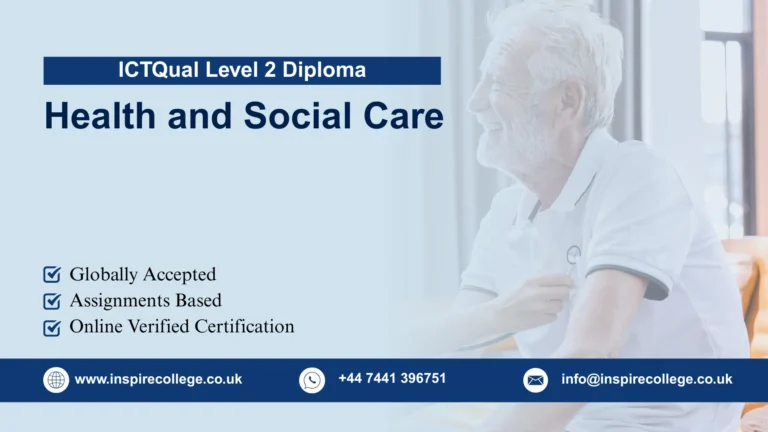
ICTQual Level 2 Diploma in Health and Social Care
The ICTQual Level 2 Diploma in Health and Social Care is a foundational qualification designed to provide learners with the essential knowledge and practical skills required to work effectively in diverse health and social care settings. In today’s rapidly evolving healthcare landscape, professionals who can deliver safe, compassionate, and person-centred care are in high demand. This diploma equips learners with the competence to meet these industry expectations and contribute meaningfully to the wellbeing of service users.
ICTQual Level 2 Diploma in Health and Social Care covers key topics including health and safety, communication, safeguarding, equality and diversity, person-centred care, and supporting individuals with specific needs. Learners will develop a solid understanding of care principles, practical techniques for daily care provision, and the professional standards that govern health and social care practice. ICTQual Level 2 Diploma in Health and Social Care also emphasizes interpersonal skills, ethical practice, and the importance of reflective learning, preparing learners to meet the real-world challenges of care environments.
Upon completion, learners will be able to assist effectively within care teams, provide support to vulnerable individuals, and apply best practices in both residential and community care settings. The ICTQual Level 2 Diploma is ideal for aspiring care assistants, support workers, and individuals seeking to start a career in health and social care or enhance their existing experience with a recognised qualification.
By completing ICTQual Level 2 Diploma in Health and Social Care, learners enhance their employability, build professional confidence, and lay the groundwork for further career progression and higher-level qualifications in healthcare, social care management, and specialised care pathways.
To enrol in the ICTQual Level 2 Diploma in Health and Social Care, learners should meet a few basic requirements. These ensure participants can fully engage with the course content and succeed in both the theoretical and practical components, preparing them for a professional career in health and social care.
Age Requirement
Learners must be at least 16 years old. This age requirement ensures that participants have the maturity and responsibility needed to work in health and social care settings, interact professionally with colleagues and service users, and manage sensitive situations effectively.
Educational Background
No formal academic qualifications are strictly required to start this course. However, learners who hold a Level 1 qualification in health and social care or a related field may find it easier to grasp foundational concepts and build on prior knowledge. This background can provide a helpful head start in understanding health and social care principles.
Experience
Previous work experience in healthcare or social care is not mandatory. However, learners with relevant voluntary work, internships, or practical exposure to care settings will benefit from the ability to connect theoretical knowledge to real-world scenarios. This practical insight enhances learning and prepares students for hands-on care responsibilities.
English Language Competency
A basic understanding of English, both written and spoken, is essential. Effective communication is critical when interacting with colleagues, service users, and families. Language proficiency also ensures learners can successfully complete assessments, coursework, and practical exercises.
These entry requirements are designed to make the ICTQual Level 2 Diploma in Health and Social Care accessible to a wide range of learners while ensuring that participants are fully prepared to achieve the knowledge, practical skills, and professional competence needed to excel in care roles. By meeting these requirements, learners can confidently pursue a rewarding career in the UK health and social care sector and take the first step toward higher-level qualifications and career advancement.
Mandatory Units
This qualification, the ICTQual Level 2 Diploma in Health and Social Care, consists of 6 mandatory units.
- Understanding the Structure of Health and Social Care Systems
- Ethical and Legal Responsibilities in Care Practice
- Supporting Individuals with Personal Care Needs
- Safeguarding and Risk Assessment in Health and Social Care
- Managing Health and Safety in Care Settings
- Mental Health Awareness and Emotional Well-being
Learning Outcomes for ICTQual Level 2 Diploma in Health and Social Care
1. Understanding the Structure of Health and Social Care Systems
- Learners will be able to learn about the various sectors, roles, and organisations within the health and social care system, gaining a comprehensive understanding of how health and social care services are structured and delivered. This includes exploring different types of care settings, such as residential care, community care, hospitals, and specialised services, as well as understanding the responsibilities and functions of professionals working in these environments.
- Additionally, learners will understand how care services are regulated, monitored, and evaluated to ensure high-quality standards. This involves studying key regulatory bodies, inspection frameworks, and quality assurance processes that uphold safety, effectiveness, and ethical practice in health and social care. Learners will gain the knowledge to critically assess service provision, identify areas for improvement, and contribute to maintaining excellence in care delivery.
2. Ethical and Legal Responsibilities in Care Practice
- In addition, learners will understand legal requirements and professional standards essential for safe and compliant care provision. This includes knowledge of relevant legislation, regulations, and guidelines that govern health and social care practice, such as safeguarding laws, data protection, equality and diversity requirements, and workplace policies. Learners will gain the ability to apply these standards in real-world care settings, ensuring that service users receive safe, ethical, and legally compliant care.
- By the end of this module, learners will be equipped to deliver care responsibly and professionally, balancing ethical principles with legal obligations to maintain high standards of practice and protect the well-being of all individuals in health and social care environments.
3. Supporting Individuals with Personal Care Needs
- Learners will be able to develop practical skills for assisting individuals with mobility, hygiene, and daily living activities. This includes supporting service users with tasks such as moving safely, dressing, bathing, eating, and other essential daily routines, while ensuring their comfort and well-being. Learners will gain hands-on experience in using appropriate techniques and equipment to promote independence and prevent injury for both the care provider and the individual.
- In addition, learners will learn how to provide personal care while maintaining dignity, respect, and person-centred approaches. This involves understanding the importance of privacy, consent, and cultural sensitivity, and applying communication and interpersonal skills to build trust and rapport. Learners will also explore strategies to empower individuals, encourage autonomy, and tailor care to each person’s unique preferences and needs.
4. Safeguarding and Risk Assessment in Health and Social Care
- Learners will be able to identify signs of abuse, neglect, and exploitation among vulnerable individuals in various health and social care settings. This includes recognising physical, emotional, sexual, and financial abuse, as well as understanding indicators of neglect and exploitation. Learners will develop the awareness needed to detect subtle warning signs and respond appropriately to protect the safety and well-being of service users.
- Additionally, learners will gain skills in assessing potential risks and implementing strategies to manage them effectively. This involves conducting thorough risk assessments, prioritising the most vulnerable individuals, and applying person-centred approaches to safeguard their health and safety. Learners will also learn how to follow relevant policies, procedures, and legal requirements, while collaborating with colleagues, families, and safeguarding authorities to prevent harm.
5. Managing Health and Safety in Care Settings
- Learners will be able to understand and apply key infection control procedures, including hand hygiene, use of personal protective equipment (PPE), safe disposal of clinical waste, and sterilisation techniques. They will learn to identify potential hazards in health and social care environments and implement effective prevention strategies to minimise the risk of infection, accidents, and health-related incidents.
- In addition, learners will develop knowledge of emergency response procedures and workplace safety regulations. This includes understanding protocols for fire safety, medical emergencies, and evacuation procedures, as well as ensuring compliance with relevant health and safety legislation. Learners will gain the skills needed to maintain a safe environment for service users, colleagues, and themselves, promoting overall health, well-being, and regulatory adherence within care settings.
6. Mental Health Awareness and Emotional Well-being
- Learners will be able to recognise and interpret indicators of common mental health conditions and emotional distress in a variety of care settings. This includes understanding the early signs and symptoms of conditions such as anxiety, depression, bipolar disorder, and other prevalent mental health challenges. Learners will also develop the ability to identify behavioural changes, emotional responses, and environmental triggers that may indicate psychological distress.
- In addition, learners will develop and implement effective strategies to support individuals’ psychological well-being. This involves promoting positive mental health through person-centred approaches, active listening, empathetic communication, and practical interventions that encourage coping, resilience, and recovery. Learners will gain the skills to create supportive environments, provide appropriate guidance, and collaborate with colleagues and mental health professionals to enhance overall mental wellness.
These learning outcomes ensure learners gain both theoretical knowledge and practical skills necessary for entry-level health and social care roles. Graduates will be equipped to provide safe, ethical, and person-centred care across a variety of settings, enhancing their employability and professional competence.
The ICTQual Level 2 Diploma in Health and Social Care is designed for individuals who are passionate about making a positive impact in the health and social care sector. This course is ideal for:
- Aspiring Health and Social Care Professionals: Individuals looking to start a career in healthcare, social care, or related support services.
- Current Support Workers or Care Assistants: Those already working in care settings who wish to formalize their skills and gain nationally recognized qualifications.
- Individuals Seeking Professional Development: People aiming to enhance their knowledge, practical skills, and employability in the health and social care sector.
- Career Changers: Individuals transitioning from other sectors who want to build a solid foundation in health and social care practices.
- Students Preparing for Higher-Level Qualifications: Learners planning to progress to Level 3 Diplomas or higher education in health, social care, or nursing.
- Employers and Staff in Care Settings: Staff members seeking to meet workplace training requirements, improve quality of care, and enhance patient/client outcomes.
This course is suitable for learners who are motivated, compassionate, and committed to delivering high-quality care, while also developing their professional knowledge, ethical understanding, and practical competencies in line with international standards.
Completing the ICTQual Level 2 Diploma in Health and Social Care provides a strong foundation for a rewarding career in the UK health and social care sector. It equips learners with essential knowledge, practical skills, and professional competencies, opening doors to further education, career advancement, and specialised training opportunities.
Higher-Level Health and Social Care Qualifications
- Progress to the ICTQual Level 3 Diploma in Health and Social Care for advanced knowledge and skills.
- Enrol in the Level 3 Certificate in Adult Social Care to enhance professional expertise and employability.
Specialised Training and Certifications
- Gain the Level 2 Award in Safeguarding and Protection in Health and Social Care to strengthen knowledge of child and vulnerable adult protection.
- Pursue the Level 3 Award in Dementia Care to specialise in providing high-quality care for individuals living with dementia.
Career Development Opportunities
- Progress to roles such as senior care assistant or support worker in diverse care environments.
- Explore career options in residential care, community support, and healthcare settings.
Further Education Pathways
- Use this qualification as a stepping stone to Level 4 and higher qualifications in health and social care management or specialised healthcare roles.
This qualification not only enhances employability in the UK health and social care sector but also ensures compliance with professional standards, ethical practices, and best practices, making learners confident and competent healthcare professionals.
Register Now
FAQs for ICTQual Level 2 Diploma in Health and Social Care






